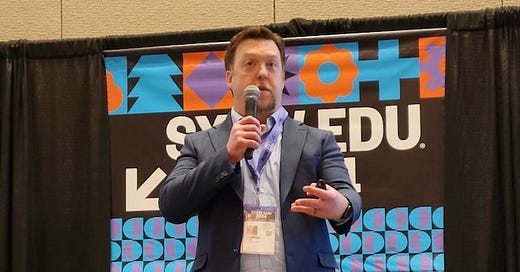Greetings from SXSW EDU!
I’m writing this latest post while attending SXSW EDU this week in Austin, TX. The EDU version of this event is perhaps less known than its sibling, the festival focused on music, film, and tech, but it is still one of the largest education-related events in the world. I was very fortunate to have a solo session about grades (connected to my forthcoming book) accepted for the conference this year. I’ve never been to the event before, and I’ve really enjoyed it.
Here is what I saw and what I learned:
The morning of Day 1 was dedicated to giving my presentation, which was called "Scarlet Letters: Fixing the Problem of Grades."
I next attended a showing of the documentary "We are Columbine," a film made by one of the survivors of the Columbine shooting, featuring several of her classmates, exploring the horror of that day and its aftermath. After the film, the director and two of the folks featured in the film were there for a Q&A. The whole thing was unbelievably powerful.
I ended the first day by seeing a performance of selections from the musical *Ranked: A Musical of Identity, Pressure, and Self-Worth*, which takes a creative look at the challenges students face in today's educational systems. Just brilliant!
Day 2 began with a visit to the expo hall. This is where lots of ed tech and other vendors have booths talking about their latest offerings. I was on the lookout for anything related to grading, but found nothing. Lots on AI though!
I’m not sure what to make of the lack of interest in grading in the ed tech sector. Either AI has just captured the day, or they feel alternative grading is not yet profitable, or they're not fully aware of the research/reform efforts yet, or all of this.
My next stop was a brief session called "Joyful Learning Centers Racial Equity in Classrooms," facilitated by Stephanie Curenton from Boston University about the ACSES measure she developed for enhancing equity in early childhood education.
Curenton made the point that early childhood education has always been rooted in social justice (from Montessori to Head Start and beyond). Equity is essential for learning. Definitely true of learning at all levels!
From there, I made my way to a session called "Can Young People Solve the Post-Pandemic Learning Equation" featuring students themselves on the panel. The takeaway? Community. The solutions will be driven by networks of teachers. students, staff, parents working together.
Next I had the opportunity to serve as a mentor at a session on helping new teachers. I was able to draw on both my work at UM's CETL and my role on the faculty in the Dept. of Teacher Education working with current and future K-12 teachers.
I finished my day at SXSW EDU’s version of Shark Tank with the The Chronicle of Higher Education's Goldie Blumenstyk and others.
Day 3 of my SXSW EDU adventure was filled with conference-adjacent activities: I went to UT Austin to talk to the good folks in their CTL and a group of faculty about alternative grading. I also had a meeting with an editor and a live podcast interview with Jeff Young from EdSurge.
I made up for the lack of sessions on Day 3 by attending a fabulous keynote from Yung Pueblo on the need for educators to take their own wellness seriously in order to serve our communities more authentically and effectively. His talk closed the conference on a high note
The overall message of this conference was one of change and radical possibility. I’ve never been to an event where so many big ideas were shared accompanied with a spirit of action. In other words, there was widespread acknowledgement that our educational systems are broken, and the sessions were all devoted to finding ways to fix it collaboratively with students, teachers, and families at the very center of these solutions. It was really inspiring.
In other news…
I’ve recently had two pieces published in the online version of the Saturday Evening Post. The first looked at a little-known figure in the history of American education (a fellow named Ezra Stiles) and the origin of grades in our schools.
The second one came out today and explores what the award-winning film The Holdovers has to say about teaching. I hope to be writing about education for the Post with some regularity over the next few months.
Thanks for reading!





